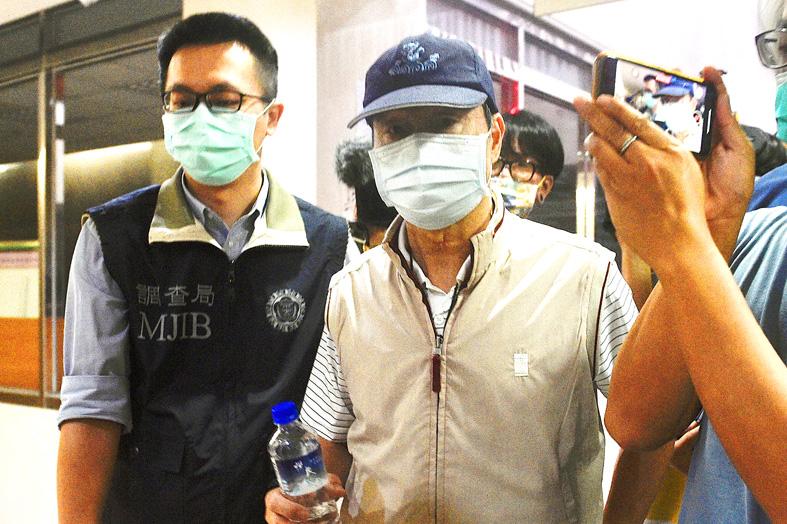Two retired air force officers, including a former major general, were yesterday morning released on bail after overnight questioning by prosecutors about their alleged involvement in a Chinese espionage ring.
Retired air force major general Chien Yao-tung (錢耀棟) and retired lieutenant colonel Wei Hsien-yi (魏先儀) were released on bail of NT$200,000 and NT$300,000 respectively after being formally named as suspects in the investigation.
The Chinese-language Mirror Media last month reported that prosecutors were investigating allegations that a Hong Kong businessman, surnamed Tse (謝), had tried to organize a spy ring in Taiwan under instructions from the Chinese Ministry of State Security.

Photo: George Tsorng, Taipei Times
Tse is suspected to have cultivated relationships with multiple retired military officers, including Chien and Wei, and arranged dinners and banquets at which they were encouraged to invite other active duty service members, the report said.
The report added that former deputy minister of national defense Chang Che-ping (張哲平) was being investigated for attending several dinners with members of the ring, as well as for allegations that his wife had traveled to Hong Kong at their expense.
Chang, the head of National Defense University, said his wife had paid for the trip herself.
He had followed military ethics guidelines at all social events and in interactions with classmates, retired colleagues and friends, he said, adding that he “absolutely committed no illegalities in speech or action.”
Chang has not been publicly named as a suspect in the case. He served as deputy minister of national defense from 2019 until the end of June, when he was transferred to his current post at the university.
The Taipei District Prosecutors’ Office on Wednesday ordered a national security team at the Investigation Bureau to search the homes of Chien and Wei, and to summon the pair for questioning as defendants in the case.
Following overnight interrogations, the prosecutors’ office issued bail terms for the two men based on their suspected contraventions of the National Security Act (國家安全法).

PREPAREDNESS: Given the difficulty of importing ammunition during wartime, the Ministry of National Defense said it would prioritize ‘coproduction’ partnerships A newly formed unit of the Marine Corps tasked with land-based security operations has recently replaced its aging, domestically produced rifles with more advanced, US-made M4A1 rifles, a source said yesterday. The unnamed source familiar with the matter said the First Security Battalion of the Marine Corps’ Air Defense and Base Guard Group has replaced its older T65K2 rifles, which have been in service since the late 1980s, with the newly received M4A1s. The source did not say exactly when the upgrade took place or how many M4A1s were issued to the battalion. The confirmation came after Chinese-language media reported

A Ministry of Foreign Affairs official yesterday said that a delegation that visited China for an APEC meeting did not receive any kind of treatment that downgraded Taiwan’s sovereignty. Department of International Organizations Director-General Jonathan Sun (孫儉元) said that he and a group of ministry officials visited Shenzhen, China, to attend the APEC Informal Senior Officials’ Meeting last month. The trip went “smoothly and safely” for all Taiwanese delegates, as the Chinese side arranged the trip in accordance with long-standing practices, Sun said at the ministry’s weekly briefing. The Taiwanese group did not encounter any political suppression, he said. Sun made the remarks when

The Taiwanese passport ranked 33rd in a global listing of passports by convenience this month, rising three places from last month’s ranking, but matching its position in January last year. The Henley Passport Index, an international ranking of passports by the number of designations its holder can travel to without a visa, showed that the Taiwan passport enables holders to travel to 139 countries and territories without a visa. Singapore’s passport was ranked the most powerful with visa-free access to 192 destinations out of 227, according to the index published on Tuesday by UK-based migration investment consultancy firm Henley and Partners. Japan’s and

BROAD AGREEMENT: The two are nearing a trade deal to reduce Taiwan’s tariff to 15% and a commitment for TSMC to build five more fabs, a ‘New York Times’ report said Taiwan and the US have reached a broad consensus on a trade deal, the Executive Yuan’s Office of Trade Negotiations said yesterday, after a report said that Washington is set to reduce Taiwan’s tariff rate to 15 percent. The New York Times on Monday reported that the two nations are nearing a trade deal to reduce Taiwan’s tariff rate to 15 percent and commit Taiwan Semiconductor Manufacturing Co (TSMC, 台積電) to building at least five more facilities in the US. “The agreement, which has been under negotiation for months, is being legally scrubbed and could be announced this month,” the paper said,